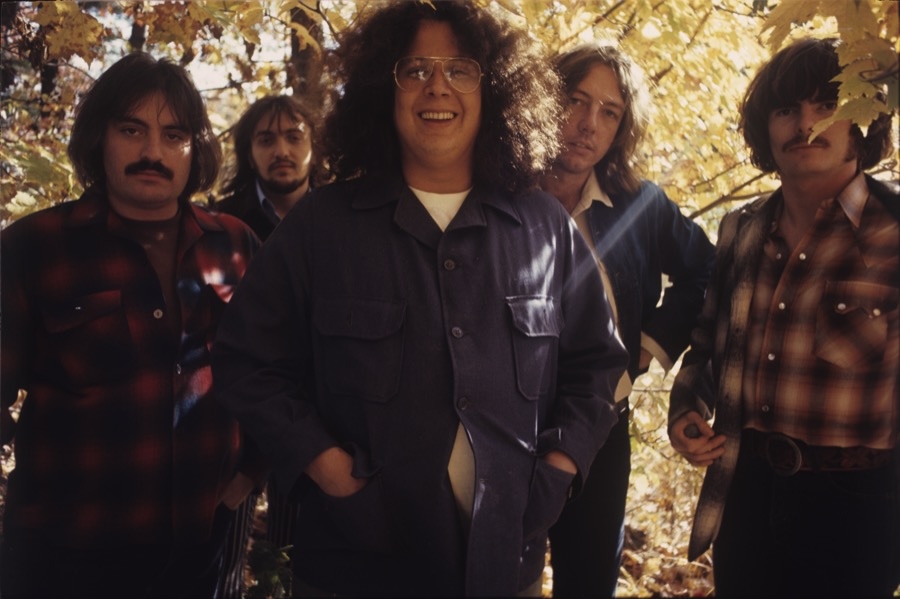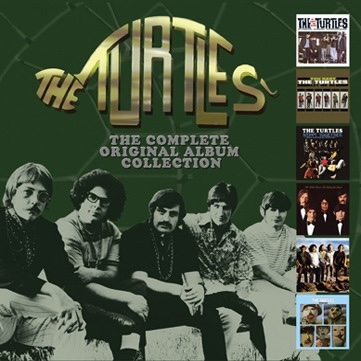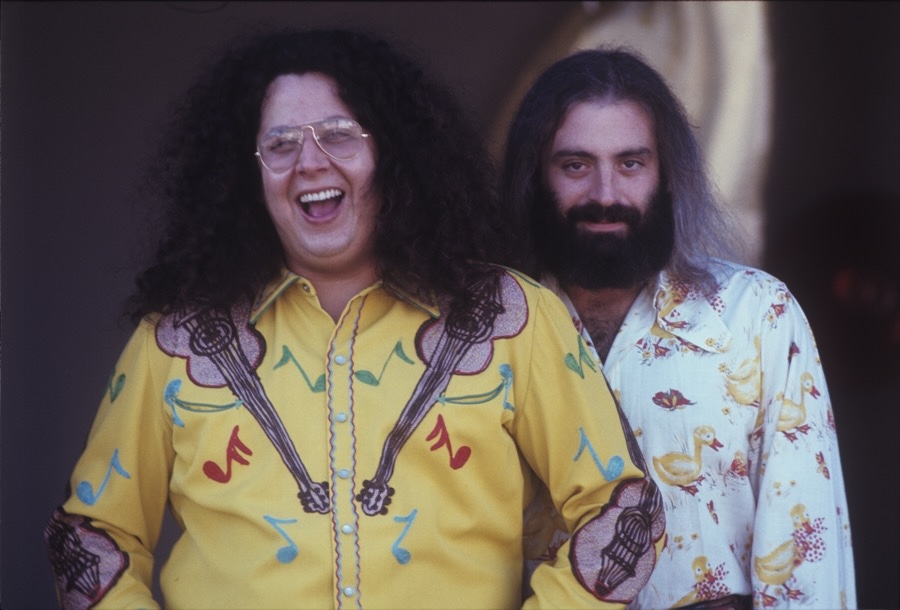R.I.P. Mark Volman—Half of "Flo and Eddie" and Turtles Founding Member
Harvey Kubernik Remembers
Photos by Henry Diltz Courtesy of Gary Strobl at the Diltz Archive
Mark Volman — a founding member of the ’60s rock band The Turtles died on September 5th at age 78 following a “brief, unexpected illness” in Nashville, Tenn. In 2020 Volman was diagnosed with Lewy body dementia.
Beyond the hit singles and the radio turntable favorites, the Turtles might be one of rock’s most misunderstood and yet beloved bands. During their original 1965-1970 run, they led a musical double life, scoring a lengthy run of unforgettable pop hits—such as “It Ain’t Me Babe,” “Let Me Be,” “Happy Together,” “Elenore,” “You Baby” and “She’d Rather Be With Me”—while making albums that were among the era’s most distinctive, inventive and gently subversive.
The Turtles are not in the Rock and Roll Hall of Fame. Then again, neither are other west coast hitmakers Johnny Rivers, the Fifth Dimension, Three Dog Night, Love, the Association, Paul Revere & the Raiders, Canned Heat and the Monkees.
With co-frontmen Howard Kaylan and Mark Volman providing heavenly harmonies, infectious sonic craft and effervescent humor, the Turtles were a ubiquitous presence on Top 40 radio for much of the ’60s, while earning their counterculture credentials with such adventurous LPs as the Ray Davies-produced Turtle Soup and the wildly eclectic The Turtles Present the Battle of the Bands, on which they impersonated a different fictional act on each track.
 The Turtles (photo by Henry Diltz Courtesy of Gary Strobl at the Diltz Archive)
The Turtles (photo by Henry Diltz Courtesy of Gary Strobl at the Diltz Archive)
Originally released on the small independent White Whale label, the Turtles’ original albums have remained stubbornly out of print for many years, leaving fans with various greatest-hits collections that only scratched the surface of the band’s deep and rewarding catalog.
That situation changed on August 19, 2016, when the Turtles’ label FloEdCo, in association with Manifesto Records, celebrated the band’s 50th anniversary with the release of a pair of definitive CD packages that encompass, for the first time, the whole of the Turtles’ recorded output from 1965 to 1970.
The Complete Original Albums Collection is a six-CD box set of the six albums that the Turtles released between 1965 to 1970, plus a wealth of rare bonus material. Each of the band’s first three albums—It Ain’t Me Babe, You Baby and Happy Together—is presented in its original mono and stereo mixes, while each of the remaining three— The Turtles Present the Battle of the Bands, Turtle Soup and Wooden Head — provide a generous assortment of rare bonus tracks, including some previously unreleased material.

The two-CD All The Singles collects the A and B sides of every original 1965-1970 Turtles 45, with the tracks presented in the same mono or stereo mixes that were heard on the original singles. All The Singles also incorporates several tracks that were prepared for singles release but not issued at the time.
“We were thought of as a hit-making machine, but buried in there was a very thought-provoking group,” Mark Volman notes. “We really cared about what was going on ... We were never really afforded the credibility of bands like the Byrds.”
The Turtles, Volman points out, were “making records that made it to the radio, but were still challenging and adventurous records. Experimental, but at the same time full of commerciality. The Turtles were really walking on a fine edge. We were only two years out of high school and we were making some pretty challenging music.”
After the Turtles disbanded at the end of the decade, Howard Kaylan and Mark Volman maintained their partnership, serving a five-album stint as members of Frank Zappa’s Mothers of Invention before releasing several albums as Flo and Eddie. They also had an extended run as FM rock DJs, provided voices for animated films and became in-demand studio singers, lending their trademark harmonies to a wide range of acts from T. Rex, Alice Cooper, Todd Rundgren to Bruce Springsteen, Blondie, the Psychedelic Furs, Duran Duran, and the Ramones.
Mark Volman and Harvey Kubernik 2016 Interview
Harvey Kubernik: As you and Howard know, as a teenager I saw the Turtles quite often during 1965-1968. I was just blown away listening again to “The Story of Rock & Roll.” The pure joy, exuberance and fun on display. I also suggest the influence and impact of this performance can be attributed years earlier to all those 10-cent hamburgers at Hamburger Handout and the 19-cent tacos you, me and Howard as kids devoured in 1959 and into the mid-sixties at Airport Village food court in Culver City.
Mark Volman: I still dream of those tacos once a week…
Harvey: Talk to me about assembling these definitive anthologies. First the six-CD package.
Mark: As far as The Complete Original Albums Collection. First of all, when we took over the ownership of the recordings there were years of clean-up that needed to be done.
One of the issues was the original record company, White Whale Records, around the country and the world they had licensed the music of the Turtles. When we got the ownership back, we spent years trying to shut down all the unauthorized recordings around the world, ‘cause we were never able to get away from bootlegging and things of that nature. It took a long time to shut down everybody. Five or six years of reaching out to the stratosphere of released versions of Turtles’ records.
We didn’t know what people were listening to. Master recordings that were being re-mastered in third or fourth generations. That was one of the initial issues that Howard and I had to deal with. Our attorneys were going out and shutting down companies we remember from the sixties; labels with cheap vinyl and cheap CDs going out. That was the first thing to do.
When we put The Complete Original Albums Collection together and the 2-CD All The Singles set it was in the hope that we would accumulate everything in one place—for the initiated and the uninitiated. You can’t just put out a set for the die-hard fans. You have to put out a set that hopefully will encompass the new fan and the die-hard fan.
Harvey: The Turtles played the instruments on all their studio albums and were not assisted by the Local Musicians Union 47, later known as the Wrecking Crew. I think Lee Michaels played keyboard on “Buzz Saw.” Which brings us to All The Singles 2-CD release.
Mark: All the Singles. We were on a very small independent record label. And they couldn’t compete with Paul Revere & the Raiders or the Byrds, who had Columbia. We couldn’t compete with the Beach Boys and the Beatles on Capitol. And we always said how fortunate it was with a record like “Happy Together” that we were able to knock the Beatles out of number one.
There are things on the set people didn’t hear [at the time]. Not because they weren’t good records but they didn’t hear them because our record company didn’t have the financial firepower to work the promotion and marketing.
What is so neat about the 2-CD All The Singles compilation, besides really known hit singles like “It Ain’t Me Babe” and “Happy Together,” are records like “You Know What I Mean” and “She’s My Girl,” that Joe Wissert produced; “Elenore,” “Somewhere Friday Night” and “You Don’t Have to Walk in the Rain,” which Ray Davies produced on our Turtle Soup; and “The Story of Rock & Roll,” written by Harry Nilsson and produced by Chip Douglas. “The Story of Rock & Roll” might be one of the greatest productions we have ever done and a powerful arrangement. Unbelievable. That whole high voice thing that we would eventually use on T-Rex records like “Bang a Gong (Get It On)” and even with Zappa and Flo & Eddie.
“The Story of Rock & Roll’ was the best recording we ever made. Put it on. We were creating Flo & Eddie with that recording. The songwriting and production. It also showcased for the first time the way we shared our vocals. Howard always had that control and that was the way it worked. You can argue that Howard is one of the best singers of that era or any era. Still. A great singer.
Harvey: Both new product compilations reinforce your own role in the support and group sound vocals. Did you have a specific philosophy in creating the secondary and colorful vocals that augmented and enhanced the lead voice of Howard Kaylan?
Mark: As far as the vocals and particularly the background vocals on the recordings of the Turtles, the basic overall philosophy of the vocal sound of the Turtles—and this goes back to the four of us: Chuck Portz, Jim Pons, Howard and myself, and then narrowed down to the three of us, Jim, Howard and I—was that it was necessary to have complementary voices. One of the things that we learned going as far back as Westchester High School was that the second tenor parts, which basically brought the melody, were important for the sound quality of the group. That was left to Howard and I. A lot of times when we would do a record, before Pons became such an integral part of the singing, the backgrounds were done by me, Howard and Al Nichol.
Howard knew my strengths were in the quality of my voice. My voice got much more familiar to the Flo & Eddie fans, going back to the early Flo & Eddie records. I think there was always something about how we put together first and second tenor, a baritone and bass. I think there was a lot of thought in those background parts. A natural thing. As we became more and more in charge of our records and in arrangements the stuff that we brought became more and more obvious. We were pretty much the shit in terms of production of the sound.
But, you know, Howard understood that we had the songs and a friendly voice when we made records in the sixties. We had records and a familiar lead singer from song to song on the radio. That was very valuable. A familiar sound. Howard Kaylan of the Turtles or Micky Dolenz of the Monkees. We understood how important Howard was as a lead singer.
Harvey: “Elenore” followed the massive hit single “Happy Together.”
Mark: “Elenore” was written by Howard in a hotel room in Chicago as they [White Whale Records] wanted another “Happy Together.” We sat down and shaped that song into the record that would eventually come out. Check out the second chorus. Chip Douglas produced it.
In my 2009 book, "Canyon of Dreams: The Magic and the Music of Laurel Canyon", Mark Volman commented on Zappa.
“Rehearsing with Frank was scary. He was the embodiment of a union man. There was never a time for fun. Frank was not like any rock person I knew. He didn’t go out to the movies; he didn’t go to Starbucks; he wasn’t pining for attention like every other rock star. He felt best when he was at home in Laurel Canyon. He was there to sleep, he was there to write, and he was there to raise a family.
“Frank never worried about what impact he had. He never worried about what reviewers thought of him. He was constantly working. We would finish an album and it would get released. He would work, tour, do promotion, and he was already working on the next thing.
“In our Flo & Eddie show, we did satire and parody, and carried on Frank’s mission to make fun of celebrity.”
I spoke with Volman again in July of 2016, and he further reflected on his journey with Zappa.
“I think there are a lot of fans of Flo & Eddie and Zappa. It’s important ‘cause in the way Zappa has un-earthed the important parts of the Turtles.
“Howard and I never joined Frank for the longevity. We joined Frank. We were Hollywood friends of the band. We were at recording sessions at A&M for the Absolutely Free album. Howard and I were in New York hearing Ruben and the Jets at Frank’s little underground apartment where he and Gail were living at.
“We were really fans, and the opportunity to sing with Frank was a part of the relationship that we already had. The fact that we were getting the opportunity and we wanted it to be big. We wanted it to be as popular as it could be every time we did a record.
“It’s funny, because some of those recordings are borderline Turtles records. ‘Sharleena’ and things like ‘She Painted Up Her Face’ from 200 Motels. There are a lot of recordings we did with Frank that were punctuated with Turtles harmonies and backgrounds. And Frank knew how to use our voices. He went to school with us.
“What he accomplished was that we were one big thing that we could all do together. Live at the Fillmore East and Chunga’s Revenge. And Frank Zappa and The Mothers of invention Live at Carnegie Hall. A 2011 4-CD release. It showcased how Frank used us. Not only to punctuate the sound the recordings but to bring the Mothers and the Turtles closer together in terms of the comedy and the great recordings. When I hear those records, I am just amazed. I don’t remember how much work that went into those records. But the recordings that are out there.
“Last year Dweezil Zappa invited Howard and I out to his camp to just speak to the fans. And we put together a 40 minute show with Dweezil. We played live in Woodstock at this performing arts theater. That was a great evening.”
Photo by Henry Diltz Courtesy of Gary Strobl at the Diltz Archive
By Harvey Kubernik Copyright 2016, 2025
(Harvey Kubernik is the author of 20 books, including 2009’s Canyon Of Dreams: The Magic And The Music Of Laurel Canyon, 2014’s Turn Up The Radio! Rock, Pop and Roll In Los Angeles 1956-1972, 2015's Every Body Knows: Leonard Cohen, 2016's Heart of Gold Neil Young and 2017's 1967: A Complete Rock Music History of the Summer of Love. Sterling/Barnes and Noble in 2018 published Harvey and Kenneth Kubernik’s The Story Of The Band: From Big Pink To The Last Waltz. In 2021 the duo wrote Jimi Hendrix: Voodoo Child for Sterling/Barnes and Noble)







































.png)








